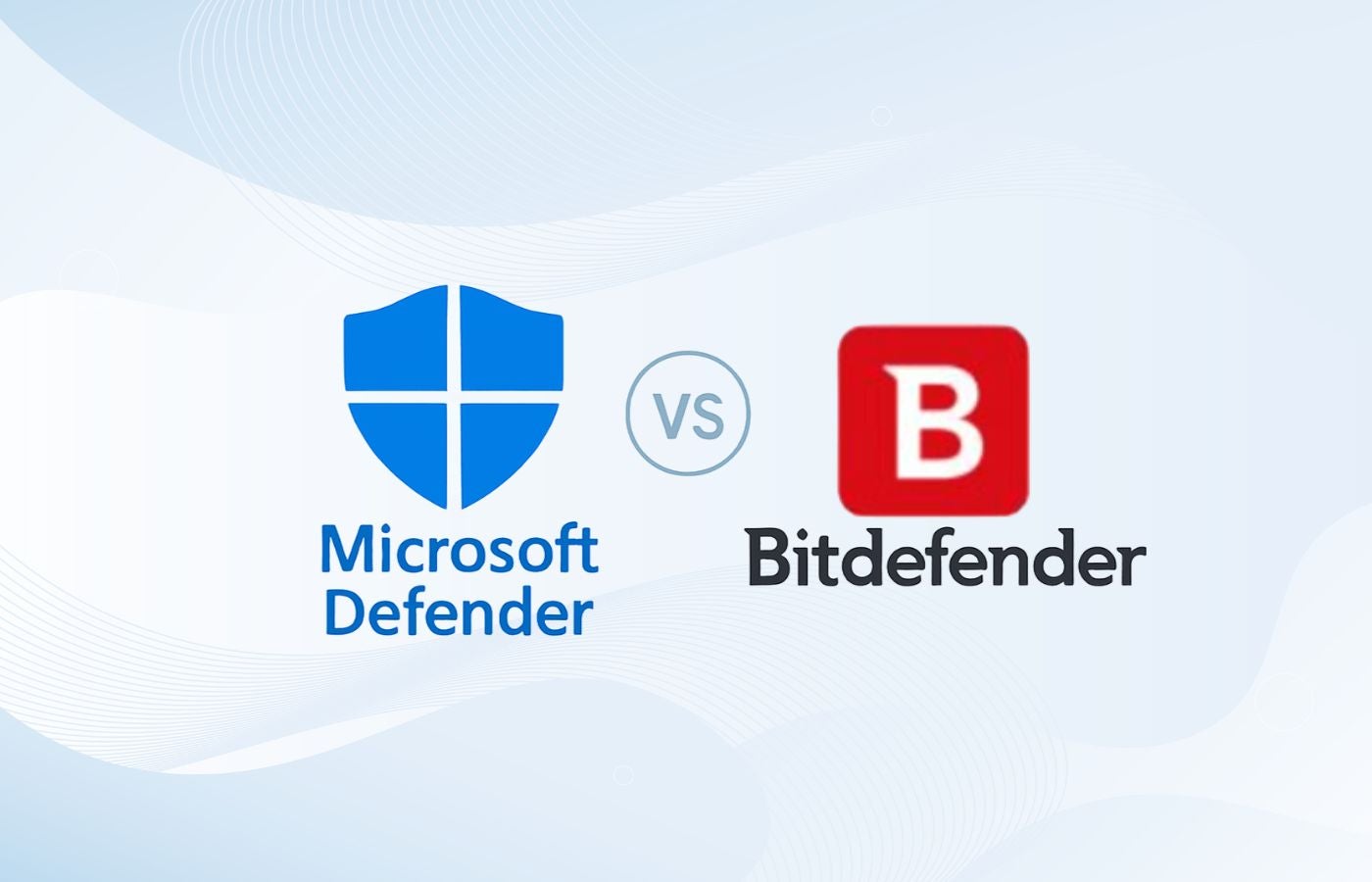Bitwarden is a password manager for organizations of all sizes, but it’s particularly suited to smaller and mid-sized teams. Password managers protect user credentials with features like two-factor authentication and encryption. Bitwarden adds to these with vault sharing, role-based access controls, and self-hosting on your business’s servers. Bitwarden may not fit all advanced enterprise needs, but mid-sized teams should consider it for its array of core features.
What You Need to Know About Bitwarden
| Bitwarden is a great solution for teams that want to host their own password management instance or enjoy the benefits of an open-source PM product. But it may not be suitable for large enterprises that need extra features or startups that can’t afford its business pricing. | ||
| Overall Rating: 4.1/5 • Core Features: 4.6/5 • Usability & Admin: 4.5/5 • Security: 5/5 • Advanced Features: 3.3/5 • Pricing: 2.7/5 • Customer Support: 4/5 | Pros | Cons |
| ✔️ Self-hosting available | ❌ Free trial is only 7 days | |
| ✔️ Positive overall user reviews | ❌ Limited support channels | |
| ✔️ Plenty of core features | ❌ Lacking a couple of extra features | |
Continue reading about Bitwarden’s main use cases, pricing, and main features, or jump down if you’re interested in learning about how we scored Bitwarden in six major categories.
Featured PartnersFeatured Partners: Password Management Software
eSecurity Planet may receive a commission from merchants for referrals from this website
Who Should Use Bitwarden?
Bitwarden offers a strong set of core password management features for small and mid-sized businesses, as well as eye-catching documentation and self-hosting functionality. If your business is looking for the option to host a PM product on your own servers, or you’re interested in an open-source solution, Bitwarden is a good option. It’s also well-suited to teams that are comfortable with missing a couple of advanced features.
The following list includes some businesses that should consider Bitwarden:
- Experienced IT teams: If your business already has a lot of hardware and you’d prefer to manage as much of your password manager as possible, Bitwarden provides that flexibility.
- Teams comfortable without some advanced features: While Bitwarden lacks a couple of nice-to-have features like guest accounts and travel mode, it offers plenty of core and enterprise features sufficient for many teams.
- Developers or DevSecOps teams: Because it’s an open-source solution, Bitwarden is a good choice for dev teams that want to contribute their expertise to the existing codebase.
Who Shouldn’t Use Bitwarden?
Bitwarden is a fantastic product for medium-sized teams, especially ones interested in hosting a password manager on their own hardware. However, it’s lacking a few enterprise-level features, and it also doesn’t give businesses access to a dedicated customer service manager over time. It may also be too expensive for some startups.
The following list highlights some teams that may not have the best experience with Bitwarden:
- Enterprises looking for the full package: While Bitwarden has a large catalog of core features, it’s missing perks like guest accounts or travel mode, so it’s not as fully-featured as some enterprises may want.
- Teams that want extra support: Bitwarden doesn’t offer a dedicated customer service rep or phone-based technical support, so it may not be a fit for businesses that need extensive customer support.
- Startups with limited funds: While Bitwarden is more affordable than some direct competitors, it’s still a little expensive for very small businesses or extremely tight budgets. And it has no free-for-life plan, so it could be challenging for startups.
If any of these examples sound like your business and you don’t think Bitwarden will be a good fit, scroll down to our list of alternative products for a few other options.
Bitwarden Pricing
The following table provides an overview of Bitwarden’s pricing plans and the features and capabilities included in them. Aside from the Teams and Enterprise plans, Bitwarden also offers a plan for large organizations; contact the sales team for a quote specific to your business’s needs.
| Teams | Enterprise | Custom Plan | |
|---|---|---|---|
| Pricing (Annual Billing) | $4/user/month | $6/user/month | Contact for quote, free trial information, and feature details |
| Free Trial | 7 days | 7 days | |
| Key Features | Event and audit logs, user groups, unlimited sharing within collections, API access, directory connector | Everything in Teams, SCIM support, option to self-host, custom roles, account recovery, passwordless SSO integration | |
| Number of Users | Unlimited | Unlimited | |
| Encrypted File Attachment Storage | 1 GB personal and 1 GB for Organizational items | 1 GB personal and 1 GB for Organizational items |
5 Key Features of Bitwarden
Bitwarden offers one of the strongest sets of core features in the password management market, but it also offers rare features like self-hosting local vaults. Aside from self-hosting, Bitwarden also has password management staples like single sign-on, business reports, vault sharing, and security policy management.
Reporting
Bitwarden’s reporting functionality includes vault health reports, which help IT and security teams identify issues or potential vulnerabilities within vaults. While vault health reports are restricted to paid plans (including the business ones), Bitwarden’s data breach report is free for all users.
According to Bitwarden, Reused Passwords and Weak Passwords reports run locally on customer clients, which means Bitwarden can’t access the unencrypted report data. This helps secure sensitive information that might appear in reports.
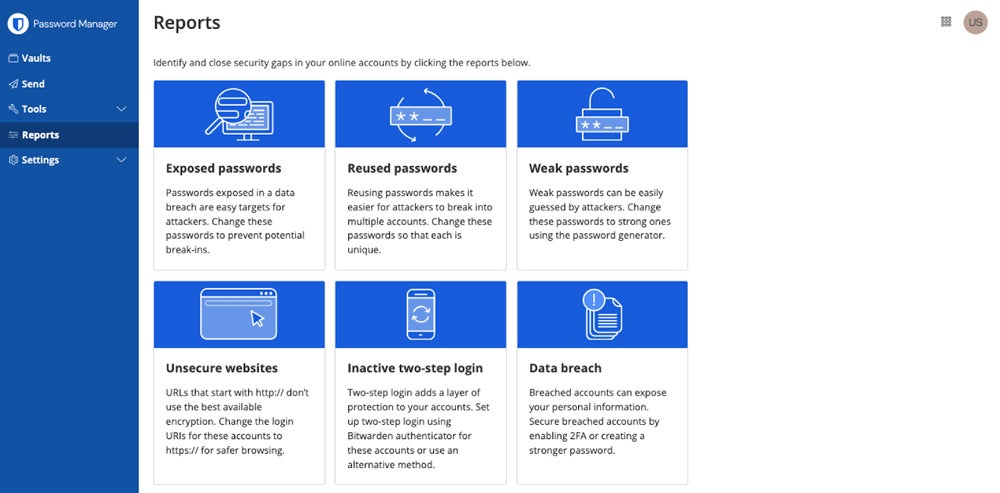
Password Sharing
Bitwarden uses Organizations, digital groups of business users, to facilitate password sharing between teammates. An Organization connects a specific subset of users — for example, the IT team — and allows their teammates to share a Collection of vaults with them.
Once the IT team has access to the Collection, they can access all the password vaults and use those credentials to log into the associated applications. Bitwarden also allows admins to configure the type of access each user receives to the credentials within the vault.
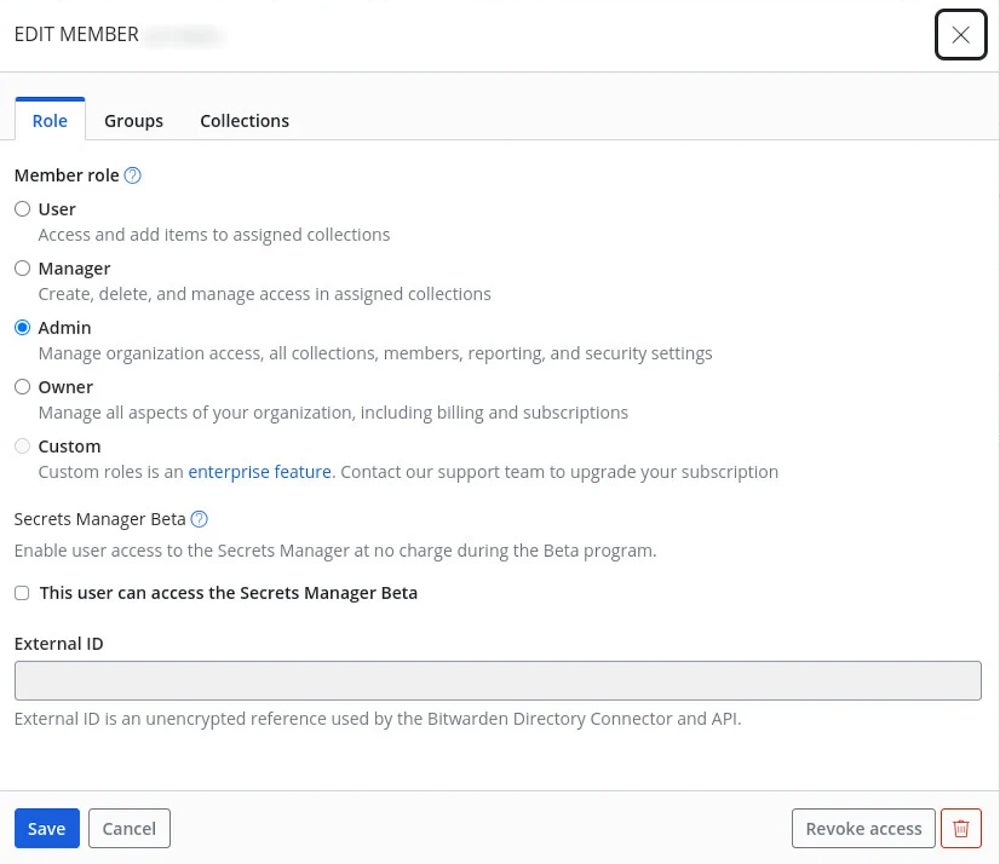
Security Policy Management
One area where Bitwarden stands out is in its administrative management features. While security policy management isn’t the only feature, it’s one of the key capabilities for businesses looking to manage consistent policies within their organization.
Admins can require a certain length for users’ master passwords, require two-step authentication, and set a maximum vault timeout limit. Policy management helps IT and security admins standardize protective rules for their whole team. Security policies are available in the Enterprise plan.
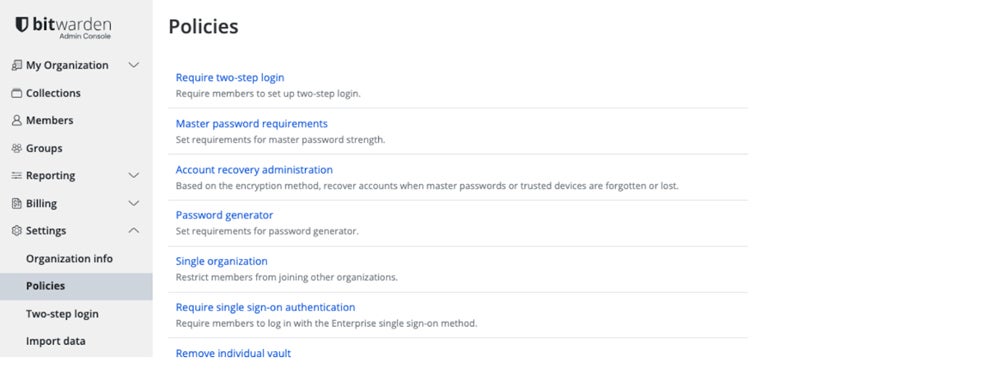
Single Sign-On
Bitwarden offers single sign-on so business users can authenticate themselves using their identity provider. Users still need to input their master password because Bitwarden cannot access any password data on their end since it’s encrypted when stored in Bitwarden vaults. Bitwarden offers integrations with Okta, JumpCloud, OneLogin, Ping Identity, Microsoft Entra ID, and other SSO vendors. Passwordless SSO is available in the Enterprise plan.
Are you interested in learning more about single sign-on solutions? Read more about our picks for the best SSO products, which include many of the top IAM providers.
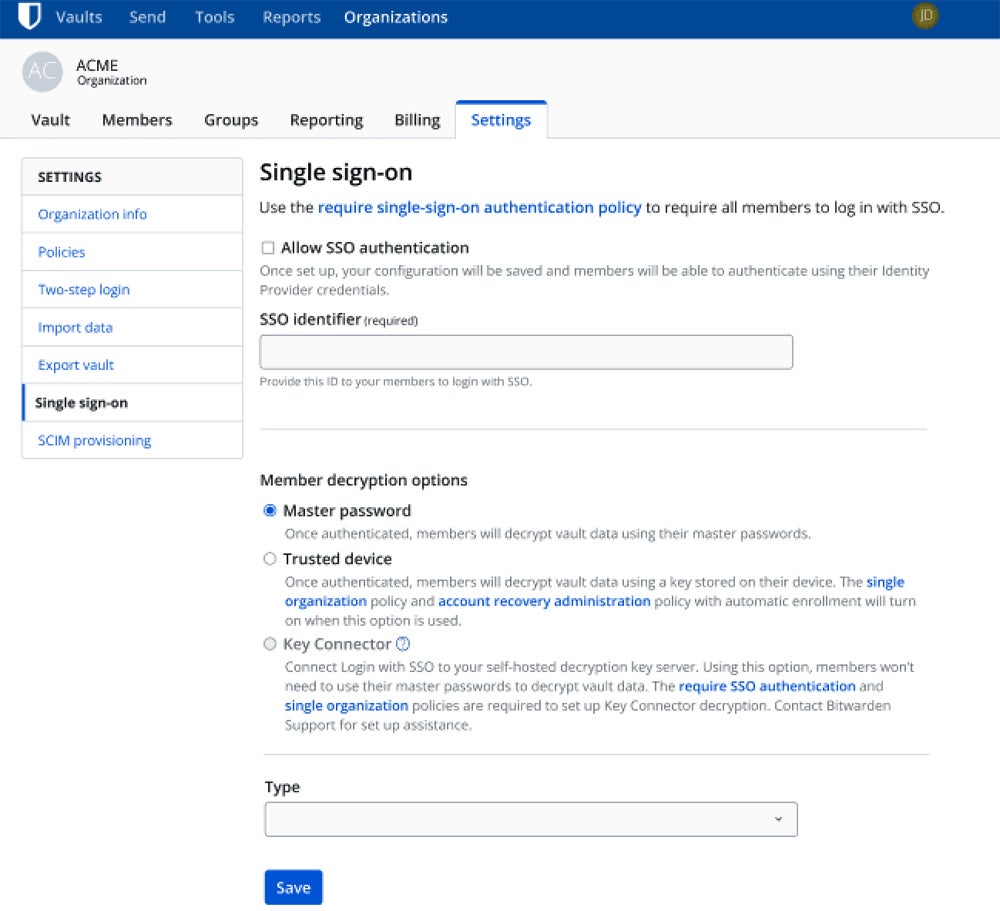
Self-Hosting
Bitwarden offers businesses on the Enterprise plan the ability to host the product on their own servers using Docker containers. Self-hosting Bitwarden gives teams more control and flexibility over protecting their password data; it also puts the burden of hardware maintenance and data security on the customer. This feature is particularly beneficial for experienced IT and security professionals who want to closely manage their password management environment.
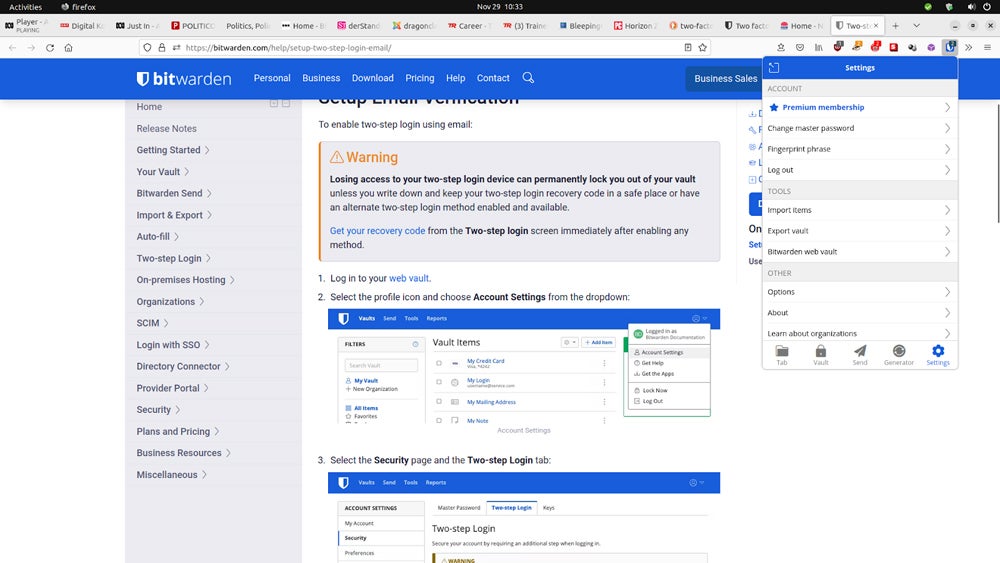
If you’re interested in more information on Bitwarden’s password management tools, head to its site.
Bitwarden Ease of Use
Contributing factors to Bitwarden’s strong usability include readable documentation with plenty of example images and a command line interface (CLI) for managing secrets. Bitwarden supports Safari, Chrome, Firefox, and Microsoft Edge, as well as some less well-known browsers like Opera. Because it’s open-source, individual users from across its customer base can contribute to the product code.
Bitwarden also receives strong overall customer reviews for ease of use. Customers are particularly happy overall with its user interface, calling it user-friendly, although a few do mention it being clunky or dated.
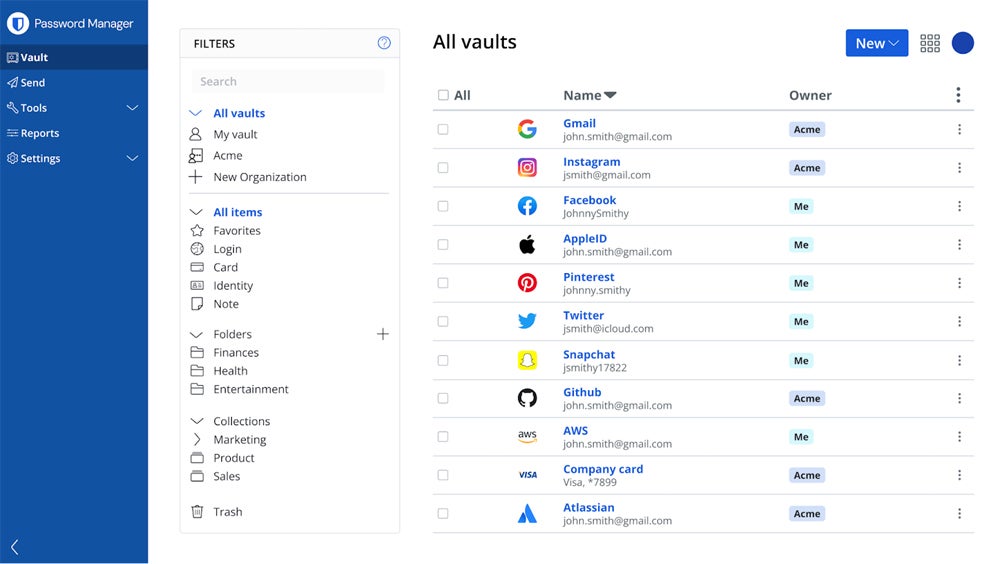
Bitwarden Customer Service
Bitwarden makes email, community forum access, and a web ticketing portal available to customers 24/7. This doesn’t automatically mean users will receive rapid responses, though — it’s just 24/7 availability to contact Bitwarden. There is no phone support or Slack for guaranteed same-day response.
While Bitwarden’s support channel options are limited, overall customer reviews speak highly of the support team and its fast response. Bitwarden’s customer support is suitable for teams that are fine with just email, and while it doesn’t have a wide range of customer service channels, overall user sentiment indicates decently speedy replies.
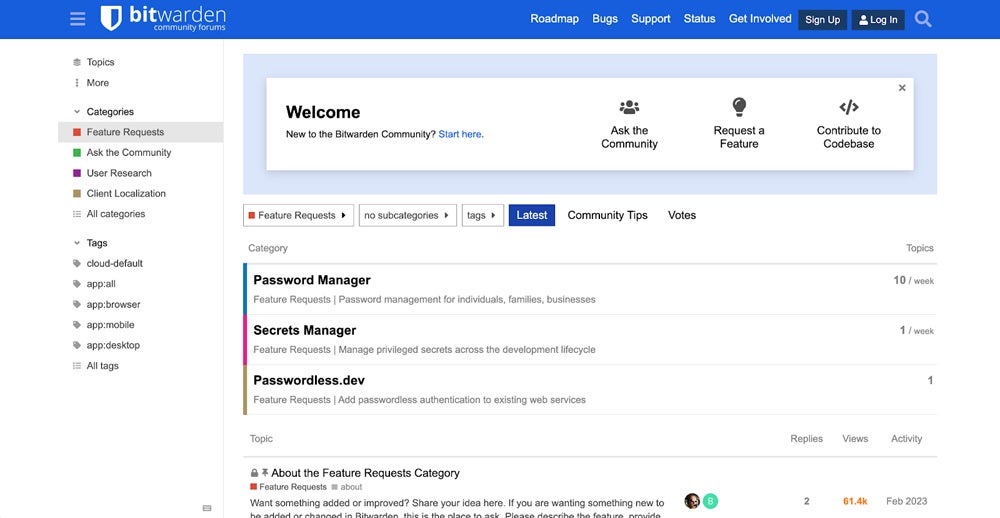
Alternatives to Bitwarden
Although Bitwarden is a strong product and popular overall with its customers, it’s not a perfect fit for all teams, particularly ones looking for rapid support channels or extremely low prices. If Bitwarden doesn’t sound like it’ll meet all your business’s needs, consider 1Password, Keeper, or Roboform instead.
1Password
1Password is an enterprise-grade password management product that’s particularly suited to large organizations with significant data protection needs due to its stringent security controls. Like Bitwarden, it offers zero knowledge and has a clean breach history. 1Password is a bit more expensive than Bitwarden, at $7.99 per user per month, and it’s a little harder to learn than some comparable products. But like Bitwarden, it has fantastic user documentation.
1Password offers a strong set of password management features, including additional capabilities like travel mode and guest accounts. These nice-to-have features, coupled with 1Password’s excellent security reputation, set the product apart. It’s ideal for large businesses focused on intense password protection, and it offers a wider range of enterprise-grade features.

Learn more about the differences between the two platforms in our article comparing Bitwarden and 1Password.
Keeper
Keeper is a password management system for businesses, MSPs, and public sector organizations. Like Bitwarden, Keeper receives high overall customer reviews for ease of use and customer support. It also has user groups and an Active Directory integration through the Enterprise plan.
Keeper also offers a secret manager product, which protects digital items like API keys, access keys, and database passwords. It’s a good choice for teams that consistently store highly sensitive data. Managed service providers should also consider Keeper; its privileged access management platform — delivered as a service — is tailored directly to their needs. Keeper’s Business pricing starts at $3.75 per user per month.

RoboForm
RoboForm is a password manager ideal for SMBs and teams looking for rapid support channels. It offers phone callback and live chat during business hours and 24/7 email support. Like Bitwarden, RoboForm offers credential sharing through groups and security policy management features.
RoboForm is also extremely affordable for small businesses, so if Bitwarden doesn’t quite meet your budget needs, RoboForm is a great choice. Its business plan for 26-100 users starts at $34.95 per user annually, which breaks down to a monthly cost of $2.91 per user.
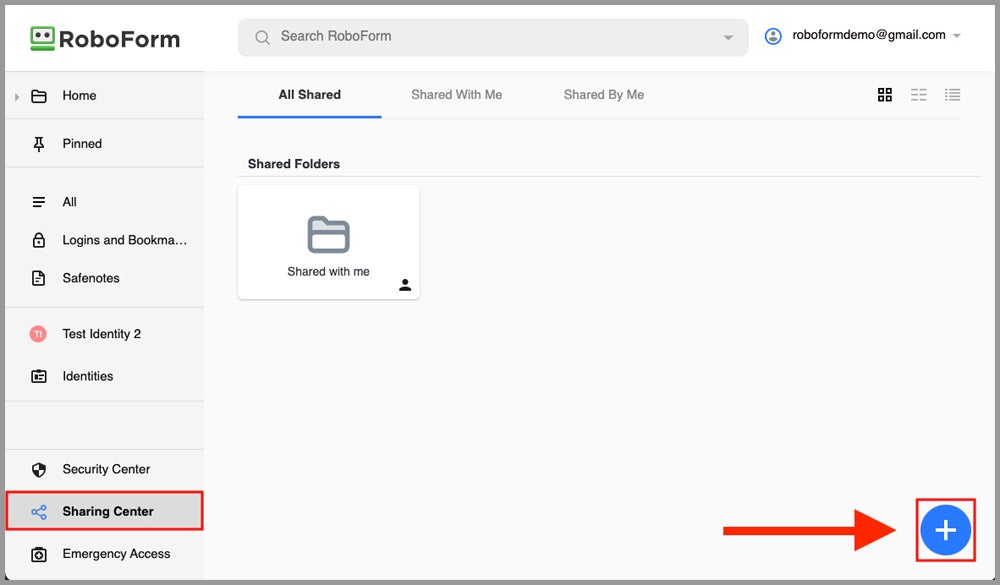
If you want to consider some other options, read our buyer’s guide to password managers, which also includes LastPass and NordPass.
How We Evaluated Bitwarden
To score Bitwarden in the password manager category, we created a comprehensive product scoring rubric with six major categories that buyers consider when purchasing PM products. We weighted each of the six main criteria and also included multiple subcriteria, which received their own weighting. The scores Bitwarden received based on its selection of features, capabilities, and documentation contributed to its final score of 4.1.
Evaluation Criteria
Because PM solutions must have a set of key features to be successful, we considered core product features first. We also looked at Bitwarden’s usability, including administrative features like self-hosting and documentation. Next, we considered advanced features, such as passkeys and zero knowledge; the product’s overall security posture; and pricing plans compared to the overall PM market. Finally, we evaluated customer support options and availability.
- Core features (25%): Core password manager capabilities include MFA, secure password sharing, reporting, and support for major operating systems.
- Score: 4.6/5
- Usability and administration (20%): We examined factors that affect product administration and ease of use, like support for different browsers and the ability to self-host your organization.
- Score: 4.5/5
- Security (15%): We considered Bitwarden’s overall security posture, including carrying out regular audits, encryption transparency, and breach history.
- Score: 5/5
- Pricing and transparency (15%): We considered customer service options like 24/7 support hours, a product demo, and multiple support channels.
- Score: 2.7/5
- Advanced features (15%): We evaluated nice-to-have features like passkeys and guest accounts, as well as the ability to self-host.
- Score: 3.3/5
- Customer support (10%): We looked at the availability of dedicated customer reps, demos, overall review scores, and support hours, as well as customer support channels like email.
- Score: 4/5
Bottom Line: Bitwarden Could Fit Your Core Password Management Needs
Bitwarden would be a strong choice for its large core feature set and glowing customer reviews alone, but it offers even more to businesses: the option to self-host will particularly appeal to organizations that want as much control as possible over their PM environment. And because Bitwarden is open-source, it’s transparent about its code and allows customers to contribute to the codebase, too. Consider Bitwarden if you want a strong security partner over time.
Password protection is only one component of securing your business’s infrastructure. Learn more about overall network security and threats to your network.



